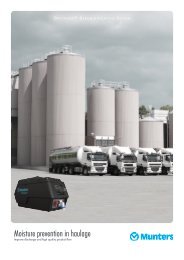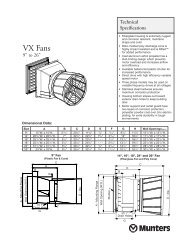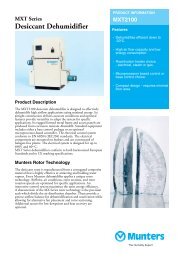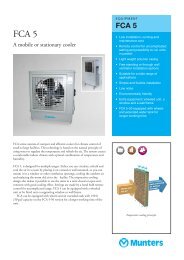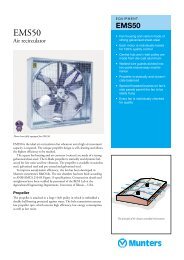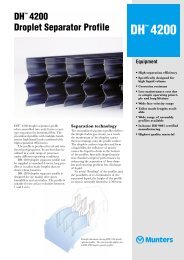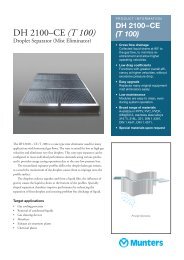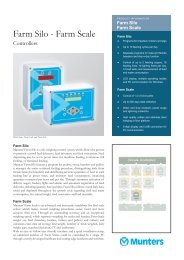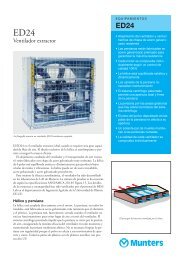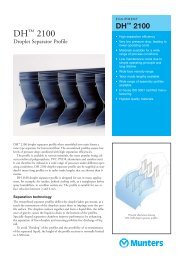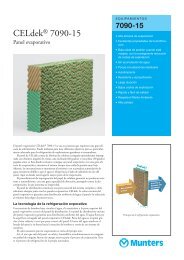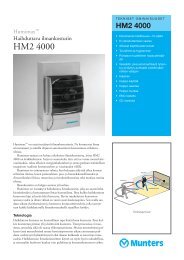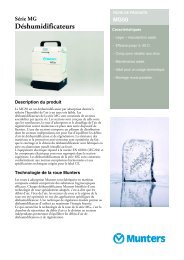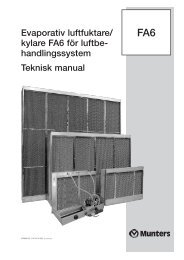Annual report 2008 - Munters
Annual report 2008 - Munters
Annual report 2008 - Munters
You also want an ePaper? Increase the reach of your titles
YUMPU automatically turns print PDFs into web optimized ePapers that Google loves.
2<br />
CEO’s statement<br />
Positive effects from strategic initiatives<br />
when markets recover<br />
<strong>Munters</strong>’ development during <strong>2008</strong> was characterized by a relatively strong first half of the year, which<br />
was followed by a significantly tougher business climate as a result of the general economic recession<br />
and the current financial crisis. The MEP 2 action program to increase efficiency in all divisions had<br />
already been announced at the beginning of the year. During the second half of the year, we took<br />
additional actions to adapt the organization to the prevailing market conditions. These measures are<br />
expected to improve our structure and competitiveness and to have positive effects on profitability<br />
when market conditions become more favorable.<br />
Our three divisions were affected to varying degrees by the<br />
recession and difficulties within several customer segments<br />
in obtaining financing. Historically, <strong>Munters</strong>’ business has<br />
not been strongly linked to general economic cycles. However,<br />
the financial crisis has resulted in several businesses that<br />
are not normally sensitive to economic cycles experiencing<br />
weaker sales due to difficulties among customers in obtaining<br />
financing. The products that we sell through distributors were<br />
particularly affected by cautiousness on the part of distributors<br />
in investing in inventories.<br />
MCS, our service division, experienced favorable growth during<br />
the year. Assignments related to the hurricanes Ike and Gustav<br />
contributed to a strong year for the division in the US. The<br />
trend for insurance companies to sign more framework agreements<br />
with the major restoration companies continued. This<br />
has proven very favorable for MCS, and the division won several<br />
new contracts during the year. In addition to investments<br />
linked to the MEP 2 efficiency program, MCS incurred substantial<br />
non-recurring costs related to structural changes. These<br />
costs included preparations for phasing out certain operations.<br />
Development in the divisions<br />
The Dehumidification division experienced stable growth during<br />
the preceding year and only noted some weakening in the<br />
European market for industrial systems toward the end of the<br />
year. In the US, sales in the Commercial segment developed<br />
very favorably as a result of the new, more energy-efficient<br />
products deriving from the 2007 acquisition of Des Champs<br />
Technologies. Within the Industrial segment, demand was<br />
favorable during most of the year, with strong sales to the two<br />
most important customer groups, the pharmaceuticals and<br />
the food industries. A contract was signed during the year<br />
with a large, global pharmaceutical company, which gave us<br />
the assignment to review all installations of dehumidification<br />
systems in the company’s global production structure and to<br />
upgrade them with the latest technology to save energy.<br />
The HumiCool division was most severely affected by the<br />
business climate. The largest business area, AgHort, which<br />
sells climate systems to breeding houses and greenhouses,<br />
experienced an unexpectedly sharp decline during the fourth<br />
quarter as a result of insufficient financing options among<br />
end-customers. Also within HVAC, where a large proportion<br />
of sales comprise mobile heaters, the decline as a result of the<br />
financial crisis was substantial. Demand from many small<br />
customers collapsed, and distributors became very cautious<br />
in inventory management. Not least within mist elimination,<br />
order bookings from coal-fired power plants were weak<br />
throughout the year. In the important US market, this was<br />
primarily a result of opportunities for trading in sulfur emission<br />
rights across state lines being eliminated. The investment<br />
calculations for coal-fired power plants wanting to invest in<br />
better cleaning technology were thus weakened.<br />
Strategic initiatives during the year<br />
MEP 2 strengthens our efficiency and profitability<br />
At the beginning of <strong>2008</strong>, an efficiency improvement program<br />
designated MEP 2 was launched. The program was<br />
intended to increase the efficiency of the production structure<br />
in our manufacturing divisions through more rational production.<br />
Part of the program consisted of transferring a larger<br />
share of refinement processes to low-cost countries. During<br />
the year, HumiCool transferred production of smaller mobile<br />
heaters from Italy to China and corrugation machines from<br />
Sweden to Mexico. The substantial volume decline within<br />
HumiCool resulted in the division reducing personnel by<br />
slightly more than 220 persons during the last three quarters<br />
of the year. This corresponded to about 19 percent of the total<br />
number of employees in the division.<br />
Within MCS, there was a strong focus on the launch of<br />
our mobile IT system Field.Link in our five most important<br />
markets. Field.Link demonstrated its improvement potential<br />
in the UK and is now being rolled out globally. This<br />
will result in a significant improvement in field work, while<br />
allowing administration to be centralized, thus increasing<br />
quality and lowering costs. This prepares MCS to increase<br />
return on capital employed through increased efficiency, a<br />
more favorable cost structure and more efficient processes for<br />
handling accounts receivable. The system also allows work<br />
to be documented in a better manner while making relevant<br />
information more accessible for the insurance companies.<br />
Considerable work was also devoted to processes for<br />
handling accounts receivable, which have been a recurrent<br />
problem for MCS is some markets. Costs associated with<br />
this work were to considerable sums. However, we have now



